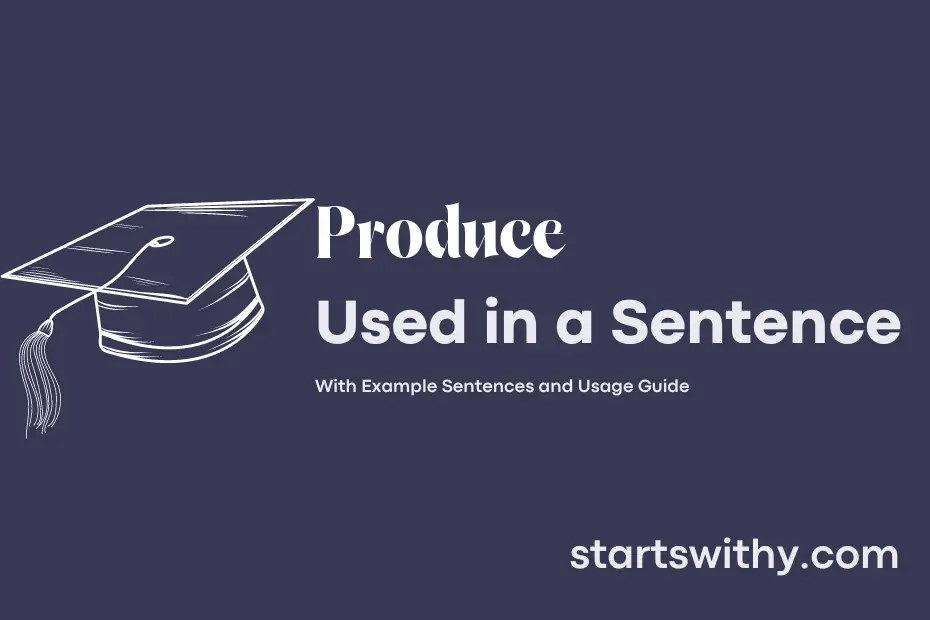Have you ever wondered what the word “produce” truly means? In simple terms, produce refers to the fruits, vegetables, and other items that are grown or made for consumption.
The term produce can also encompass goods that are manufactured or created, ranging from electronics to artwork. Let’s delve deeper into the versatile use of this word and explore its various implications in different contexts.
7 Examples Of Produce Used In a Sentence For Kids
- Produce comes from plants and trees.
- Farmers produce fruits and vegetables.
- Machines help to produce clothes.
- Factories produce toys and games.
- Animals can produce milk and eggs.
- Flowers produce seeds for new plants.
- Bees help to produce honey in hives.
14 Sentences with Produce Examples
- The college canteen always offers a variety of fresh produce for students to choose from.
- It’s important to take a break and grab some healthy produce to munch on during long study sessions.
- Produce like fruits and vegetables can be bought from local markets near the college campus.
- Many college students prefer to juice fresh produce for a quick and nutritious energy boost.
- Learning how to cook with fresh produce can help students maintain a balanced diet on a budget.
- The college’s agriculture club teaches students how to grow and produce their own vegetables.
- The college’s sustainability program focuses on reducing waste and supporting local produce.
- The campus cafeteria sources its produce from nearby farms to promote sustainability.
- Students in the culinary arts program learn how to select and prepare seasonal produce.
- Eating a diet rich in fresh produce can help students improve their overall health and well-being.
- The college hosts a weekly farmers market where students can purchase locally grown produce.
- Student organizations often collaborate on projects to produce informative guides on sustainable living.
- The college’s food science department conducts research on innovative ways to preserve and package fresh produce.
- Studying the environmental impact of different farming methods can help students make more informed choices when buying produce.
How To Use Produce in Sentences?
Produce is a versatile word that can be used in various ways in a sentence. It can mean to create, manufacture, or bring forth something. Here is a helpful guide on how to use produce effectively in a sentence.
-
Verb form (to create or manufacture): “The factory produces high-quality cars.”
- In this sentence, produce is used to show the act of manufacturing or creating something.
-
Noun form (things that are grown or made): “The farmers take their produce to the market every Saturday.”
- Here, produce refers to the items that are grown or made, such as fruits, vegetables, or other products.
-
Adjective form (quality or features that are created): “The movie received an award for its produced special effects.”
- In this example, produced is used to describe the quality of the special effects in the movie.
-
Use in a question: “What do you think will produce the best results for this experiment?”
- This question demonstrates how produce can be used to inquire about the best way to achieve certain outcomes.
By understanding these different ways to use produce in a sentence, you can effectively communicate your ideas and thoughts while adding variety and depth to your language.
Conclusion
In conclusion, the various examples of sentences using the keyword “produce” highlight its versatility in conveying different meanings. From agricultural produce to manufactured goods, the word “produce” encompasses a wide range of tangible outputs. These sentences demonstrate how “produce” can be used to describe anything that is made or grown, emphasizing the diverse ways in which the word can be applied in written or spoken language.
Whether referring to fruits and vegetables grown on a farm or cars and electronics manufactured in a factory, the word “produce” serves as a simple yet effective term for describing goods and products. Its consistent use throughout the examples showcases its importance in conveying the idea of creation or manufacturing, adding clarity and precision to the sentences in which it is utilized.



